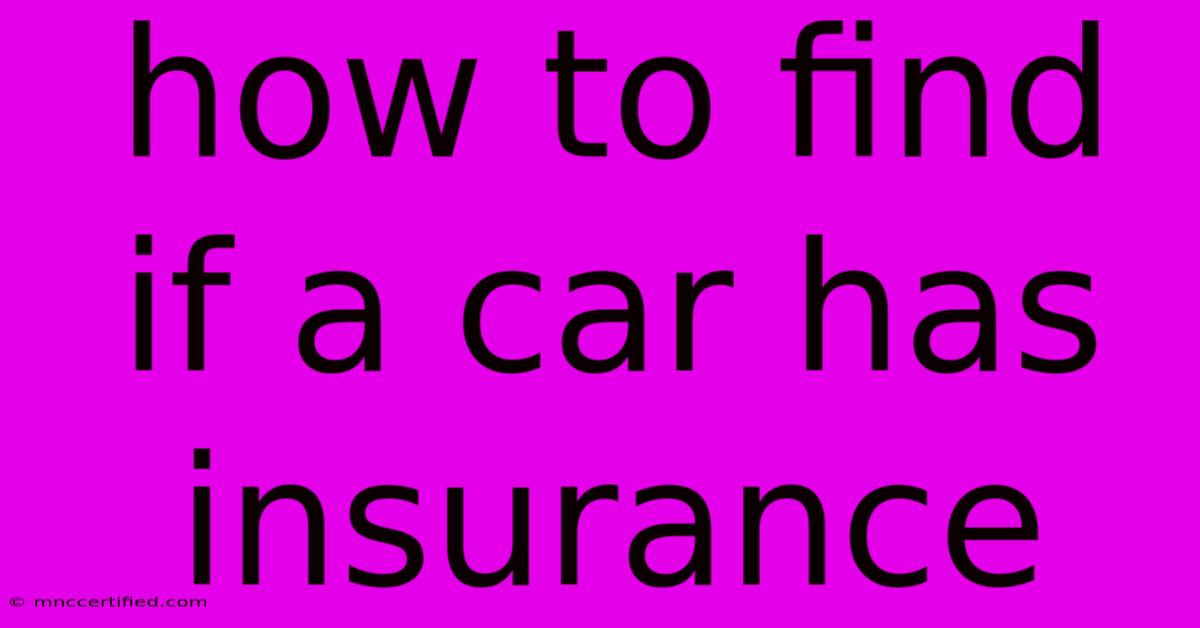How To Find If A Car Has Insurance

Table of Contents
How to Find Out if a Car Has Insurance
Knowing whether a car has insurance is crucial for various reasons, from buying a used vehicle to assessing liability after an accident. Unfortunately, there's no single, foolproof method to instantly verify a car's insurance status. However, several strategies can significantly increase your chances of finding this information. This guide outlines effective methods and highlights important legal and ethical considerations.
Methods to Check if a Car is Insured
Several approaches can help you determine if a car has insurance coverage. Remember that the success of these methods varies depending on your location and the specific circumstances.
1. Ask the Car Owner Directly
The most straightforward approach is to directly ask the car's owner for proof of insurance. This can be in the form of an insurance card or a digital copy of their policy. While seemingly simple, this is often the most effective method. Be aware that they may be hesitant to share this private information, but politely requesting it is your first step.
2. Check the State's Department of Motor Vehicles (DMV) Database (Limited Availability)
Some states allow access to limited vehicle registration information, sometimes including insurance verification. However, this access is often restricted to law enforcement, insurance companies, or specific authorized individuals. Contact your state's DMV to inquire about their specific policies regarding public access to insurance verification.
3. Use a Third-Party Insurance Verification Service (Paid Services)
Several companies offer insurance verification services, often used by businesses that need to confirm coverage before providing services (like car rentals or repairs). These services usually charge a fee and require specific information about the vehicle or owner. Research reputable providers carefully before using such services, as scams exist in this area.
4. After an Accident: Contact the Insurance Company Directly
If you've been involved in an accident with an uninsured driver, obtain their license plate number and contact their insurance company directly. While they may not confirm coverage immediately, providing the necessary details may help them investigate the situation and identify the driver's insurance status.
5. Review Public Records (Limited Information)
In some jurisdictions, basic vehicle registration information may be available through public records databases. This often includes the owner's name and address, but rarely confirms active insurance coverage. This information may be accessed through your local courthouse or online public records websites. Be aware that the information available varies widely depending on the location and the level of public access granted.
Legal and Ethical Considerations
It's crucial to respect privacy laws when attempting to verify a car's insurance status. Unauthorized access to private information is illegal and unethical. Only use methods outlined above that are legally permissible in your jurisdiction. For instance, hacking into an insurance company's database or using deceptive practices to obtain information is a serious offense.
Importance of Insurance Verification
Verifying car insurance is important for several reasons:
- Protecting Yourself After an Accident: If you are involved in an accident, knowing the other driver has insurance protects you from significant financial burdens.
- Buying a Used Car: Checking insurance history can give you insight into the car's ownership and potential risks.
- Rental Car Insurance: Some rental car agencies require verification of insurance.
Conclusion
Determining if a car is insured isn't always easy, but the methods outlined above provide several avenues for investigation. Remember to prioritize legal and ethical considerations and to respect the privacy of others while pursuing this information. Directly asking the car owner remains the most reliable and ethical approach.

Thank you for visiting our website wich cover about How To Find If A Car Has Insurance. We hope the information provided has been useful to you. Feel free to contact us if you have any questions or need further assistance. See you next time and dont miss to bookmark.
Featured Posts
-
Zearn Referral Code Crypto Hack
Nov 23, 2024
-
Erasmuss Approach Springbok Player Performance
Nov 23, 2024
-
Cher On Difficult Director
Nov 23, 2024
-
Casey Win Pa Senate Recount Ends
Nov 23, 2024
-
How To Watch F1 Las Vegas Qualifying Channel Time
Nov 23, 2024